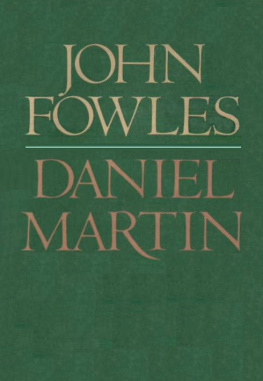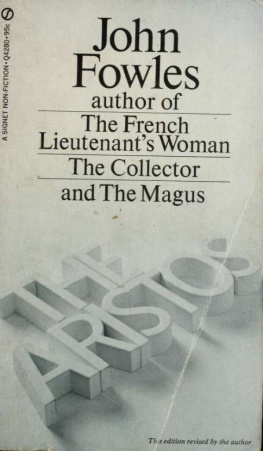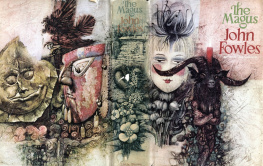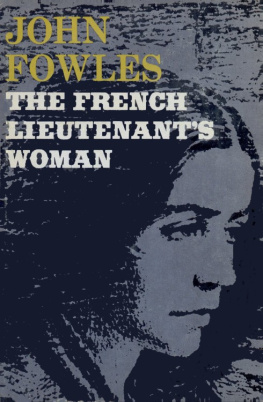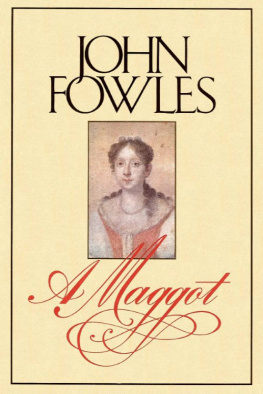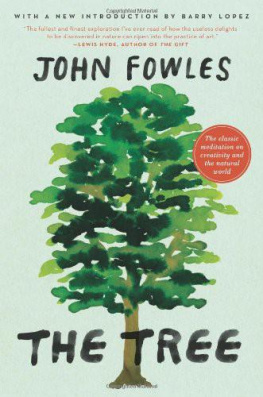John Fowles
Daniel Martin
1977
The crisis consists precisely in the fact that the old is dying and the new cannot be born; in this interregnum a great variety of morbid symptoms appears.
Antonio Gramsci, Prison Notebooks
The passages from Granisci come from Selections from the Prison Notebooks of Antonio Gramsci , edited by Quintin Hoare and Geoffrey Nowell-Smith (Lawrence and Wishart, London, 1971).
Those from Georg Lukcs are from The Historical Novel , translated by Hannah and Stanley Mitchell, and The Meaning of Contemporary Realism , translated by John and Necke Mander (Merlin Press, London, 1962 and 1963).
The three extracts from the Stratis Thalassinos (Stratis the Mariner) poems by George Seferis are as translated by Edmund Keeley and Philip Sherrard in the Collected Poems (Jonathan Cape, London, 1969).
I am grateful to all the above for permission to quote.
John Fowles
Daniel Martin
The Harvest
But whats wrong with that man?
All afternoon (yesterday the day before yesterday and today) hes been sitting there staring at a flame
he bumped into me at evening as he went downstairs
he said to me:
The body dies the water clouds the soul hesitates
and the wind forgets always forgets
but the flame doesnt change.
He also said to me:
You know I love a woman whos gone away perhaps to the nether world; thats not why I seem so deserted
I try to keep myself going with aflame because it doesnt change.
Then he told me the story of his life.
GEORGE SEFERIS: Mr Stratis Thalassinos Describes a Man
Whole sight; or all the rest is desolation.
The last of a hanger ran under the eastern ridge of the combe, where it had always been too steep and stony for the plough. It was now little more than a long spinney, mainly of beech. The field sloped from the wall of trees, westward, a gentle bosom, down to the open gate on to Fishacre Lane. The dark coats lay there in against the hedge, covering the cider jar and the dinner bundle, beside the two scythes that had been used to clear the still-dewed hedge swathe much earlier that morning. Now the wheat was half cut. Lewis sat perched behind the faded carmine reaper, craning into the sea of blond stems for stones, his hand on the mower-lever, always ready to lift the blades. Captain hardly needed the reins; so many years of plodding, just so, down the new stubble next to the still-standing ears. Only at the corners did Lewis cry, softly, coaxing the old horse round. Sally, the younger horse, who had helped on the steeper ground, stood tethered beneath a thorn not far from the gate, cropping the hedge, her tail intermittently swishing.
Bindweed ran up the stems of the corn; seeding thistles, red poppies; and lower, the little cornfield violets called hearts-ease; with blue speedwell eyes and scarlet pimpernel, shepherds glass, herb of the second sight. The fields name was the Old. Batch - batch from bake, some ancient farms own annual bread was always grown there. The skys proleptic name was California; the imperial static blue of August.
There are four figures in the field, besides Lewis on the reaper-binder. Mr Luscombe: red-faced and crooked-grinning, one eye with a cast behind his steel-rimmed spectacles, a collarless shirt with a thin grey stripe, darned, the cuffs worn, cord trousers with peaks at the back for the braces, but held up also by a thick leather belt. Bill, his younger son, nineteen, capped and massive, six inches taller than anyone else on the field, arms like hams, a slow giant, clumsy at all but his work but see him scythe, dwarf the distort handle and the blade, the swaling drive and unstopping rhythm, pure and princely force of craft, Old Sam in breeches, braces, boots and gaiters, his face forgotten, though not his limp; a collarless shirt also, a straw hat with the crown detached on one side (lets in thole air a bit, doanee see) and a tuft of wilted hearts-ease tucked in the black band. And finally a boy in his mid-teens, his clothes unsuited, a mere harvest helper: cotton trousers, an apple-green Aertex shirt, old gym-shoes.
They work in two teams, on opposite sides of the field, one clockwise, the other anticlockwise, stocking. Clutching a sheaf in the right hand, just above the binder twine, never by the twine itself, then moving on to the next sheaf, picking that up in the same way in the left hand, then walking with the two sheaves to the nearest unfinished stock, a stock being four pairs of sheaves and a single to close the door at each end; then standing before the other sheaves propped against each other, lifting the two in each hand, then setting them, shocking down the butts into the stubble and simultaneously clashing the eared heads together. The simplest job in the world, it might seem to Queenie, who stands there in the lane beside her bicycle a moment, back from her mornings cleaning at the Vicarage, watching in through the open gateway for the idle pleasure of it. The boy waves from the top end of the field and she waves back. When he looks again, a minute later, she is still there, the old beige summer hat with the band of white silk and the tired artificial rose in front, the drab brown dress, the heavy old bicycle with its fret of skirt-protective wires over the back wheel.
The boy sets the first two sheaves, the founders, of a new stock. They stand, then start to topple. He catches them before they fall, lifts them to set them firm again. But old Mr Luscombe shocks his pair down six feet away, safe as houses. His founders never fall. He smiles lopsidedly with his bad teeth, a wink, the cast in his eye, the sun in his glasses. Bronzered hands and old brown boots. The boy makes a grimace, then brings his sheaves and sets them against the farmers pair. The insides of his forearms are sore already, his fingers not being strong enough to carry the sheaves far by grasp. If the stock is some way off, he hoicks them up against his side, under his arms, against the thistles. But he likes the pain a harvest pain, a part of the ritual; like the tired muscles the next morning, like sleep that night, so drowning, deep and swift to come.
The crackle of the stubble, the shock of the stood sheaves. The rattle of the reaper, the chatter of the mower blades, the windmill arms above them. Lewiss voice at the corners: hoy then, hoyee, Capn, back, back, back, whoy, whoy. Then the click of the tongue: jik-jik, the onward rattle and chain and chatter. Thistledown floats southward across the field, in a light air from the north, mounting, a thermal, new stars for the empyrean.
And the day will endure like this, under the perfect azure sky, stocking and stooking the wheat. Again and again old Luscombe will shred an ear from its haulm and roll the grains between his heavy palms to husk them; cup his hand and blow the husks away; stare; then take a grain and bite it in half, the germ with its taste of earth and dust, and then spit it out; and finally put the remaining grains in his trouser pocket, for the poultry, that evening. Three or four times the reapers noise will stop abruptly. The stookers will stand and see Lewis climb down from his fenestrated iron saddle and know what it is again: the knotter is choked. A spew of unbound wheat behind the machine; the toolbox open. Lewis is brown and shy, much smaller than his younger brother the family mechanic, and taciturn. The nearest pair of stookers will come up and gather armfuls of the unbound wheat; take three strong stems and rope them, then lead them under the armful and rick the ends where they meet, one twist only, but tight, tucking the ears under the bind to hold it firm; leave Lewis to his labours over the knotter and walk back to where they left their uncompleted rows. In silence, apart, treading the crackling stubble.
At one Mr Luscombe will pull out his old fob, then cry to the field and start rolling a cigarette. They will straggle to the hedge by the gate, sweating, Lewis last, having taken Captain from the shafts and tethered him in the shade beside Sally; stand round the coats. The cider-jar will be unbunged. The boy is offered the first drink, from a tin mug. Bill lifts the whole gallon jar, tips it into his mouth. Old Sam grins. And the boy feels the sour green swill down his gullet, down both gullets; last years brew, delicious as orchard shade in the sun and wheat-dust. Lewis sups cold tea from a wire-handled can.

